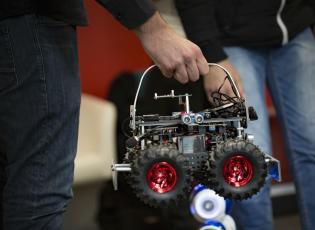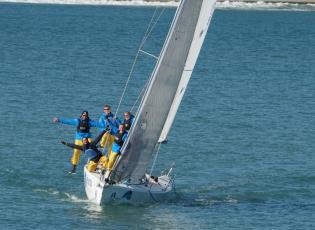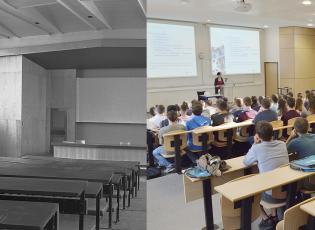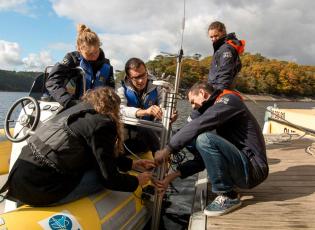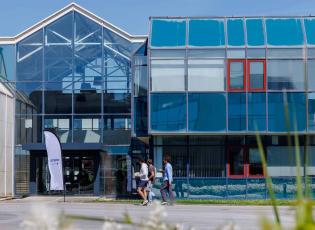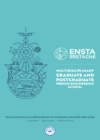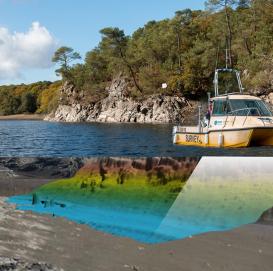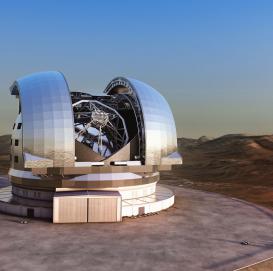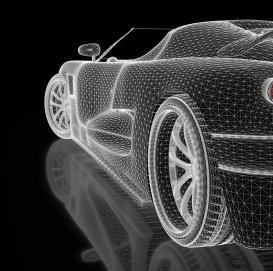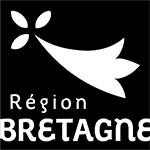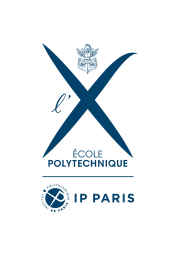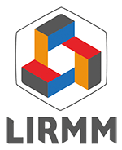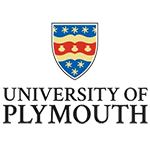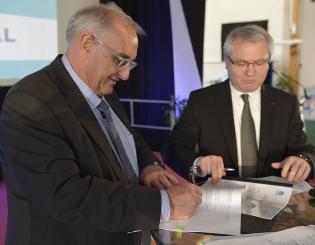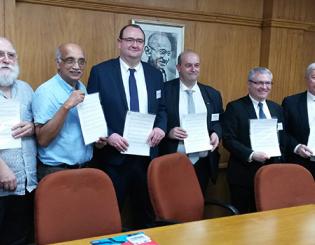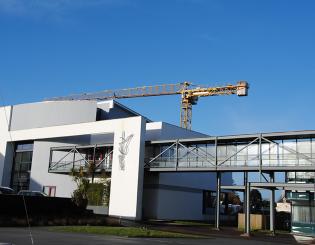
Key figures & our profile
Chiffres clés du campus ENSTA de Brest
On its Brest campus, ENSTA Bretagne is composed of a graduate and post graduate engineering school and multidisciplinary research institute.
Le campus ENSTA de Brest en détails, son histoire...
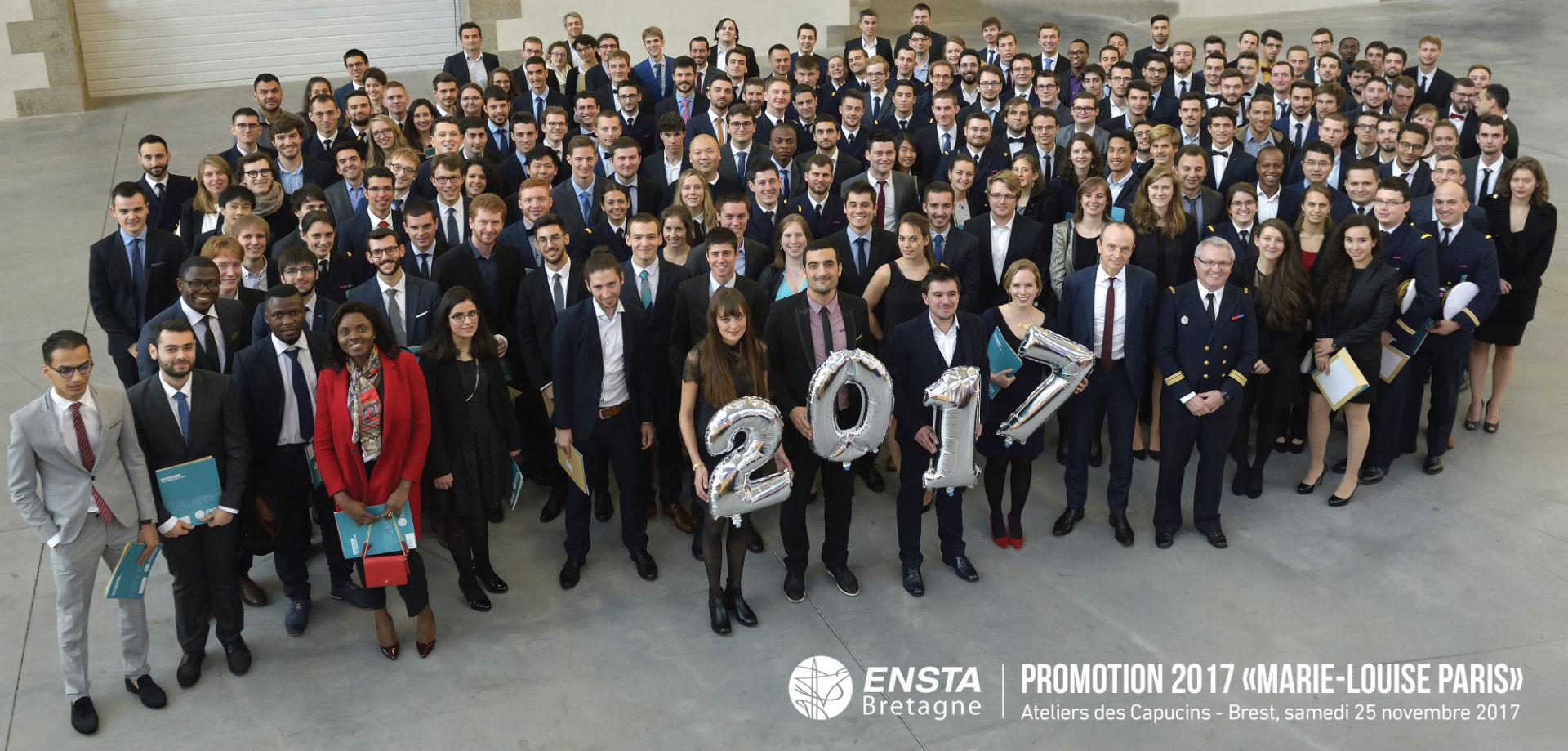
- 30% scholarship students
- 20% international students
- 18% military student engineers under contract
- 12 research teams in 3 laboratories
- 250 research professors, research engineers, technicians and PhD students in the Research Institute
- + 300 term employees, mainly professionals from industry, contribute to the training
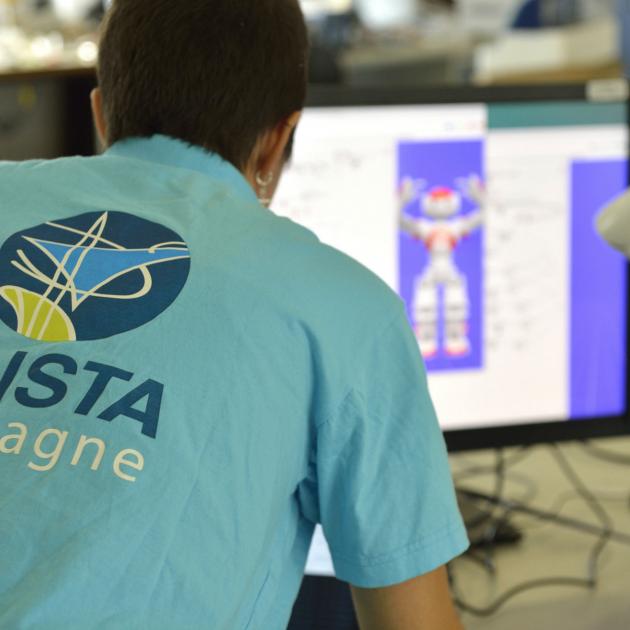
- Inheritor of 200 years of history and training
- Inheritor of 200 years of history and training
- Under the supervision of the French Ministry of Armed Forces and the Direction Générale de l’Armement (Defense Procurement and Technology Agency), as are 3 other graduate schools: the Ecole Polytechnique, ENSTA Paris and ISAE-SUPAERO
- All the training and research activities cover both the defense sector and numerous fields of civilian activities.
- through training immediately operational general engineers of great potential through training project engineers and through continuing professional training
- through applied research in close partnership with companie
- through entrepreneurship
- maritime sector : all types of ships, renewable marine energies, offshore energies, research and monitoring of the marine environment, hydrography
- defense: covering all systems of military equipment (land, sea, air) and cyberdefense, in partnership with ISAE-SUPAERO
- information and communication technologies: drones, surveillance and observation systems,
- aerospace: launchers, satellites, telescopes, drones…
- land transport: automobiles, professional vehicles, motorbikes…
- energies: at sea, hydraulic, nuclear
- research institutes
- IRDL : The Research Institute of Dupuy de Lôme (UMR CNRS 6027)
- Lab-STICC : The Laboratory of Information and Communication Sciences and Technologies(UMR CNRS 6285)
- FoAP : the The Research Center on Professional Training and Adult Learning (EA 7529)
- Including joint laboratories with companies and industrial chairs
- a "Diplôme d'ingénieur" (i.e MSc in Eng.), accredited by the Commission des Titres d’Ingénieur (CTI)
- a co-operative "diplôme d'ingénieur" program, accredited by the CTI
- 10 masters, accredited by the Ministry of Higher Education, Research and Innovation
- 5 Advanced Masters, accredited by the Conférence des Grandes Ecoles
- 3 Syllabus for Ecole Polytechnique engineering graduates
- PhD
Chiffres clés de l'ENSTA
qui réunit les campus ENSTA de Brest et Paris-Saclay à Palaiseau
Two centuries of history
ENSTA Bretagne has delivered the title of engineer since it was created (in 1934). It is one of the oldest schools on which the reputation of this prestigious diploma, accredited by the Commission des Titres d’Ingénieur (CTI ) was built (state body governing the quality and standards of French graduate engineering schools).
Built on a legacy of training on its Brest campus since 1819, ENSTA Bretagne and its history go hand in hand with the history of engineering, industry, the arsenals and new technology in France.
Creation of the Écoles de Maistrance des Arsenaux (training masters and foremen) which went on to become the Écoles Techniques Supérieures (ETS)
Authorization granted for the ETS to deliver engineering degrees
Creation of the Délégation Ministérielle pour l’Armement which became the DGA (Direction Générale de l’Armement), the Defense Procurement and Technology Agency
Creation of ENSIETA* to train DGA engineers for all the defense programs (3 sites : Brest, Arcueil and Toulouse).
The training at Arcueil is transferred to Brest which almalgamates training in the design of naval systems, hydrography, land armament and pyrotechnics ( aeronautical construction is at Toulon, currently ISAE-SUPAERO).
The competitive entry exams are open to civilian students.
There are now a majority of civilian students in engineer training, whereas the number of military students remains relatively stable.
The cohorts reach 150 students. The research laboratories receive about 100 researchers (lecturers, technical executives and PhD students).
Inauguration of the Research Institute with its facilities for both civilian and military purposes by the Ministers of Defense and Higher Education.
Training open to company-linked engineers (apprentice engineer training or continuing professional training).
ENSIETA obtains ISO 9001:2000 certification for all its activities.
ENSIETA changes name to ENSTA Bretagne and creates an ENSTA group with ENSTA ParisTech. In the same year, the school inaugurates the Research Institute extension (+1500m²).
ENSTA Bretagne integrates the Concours Commun des Ecoles de Mines (the Ecoles des Mines graduate schools competitive entrance examination system) which becomes the Concours Commun Mines Télécom in 2015.
ENSTA Bretagne and IMT Atlantique inaugurate a strategic partnership in the presence of the Minister of Defense
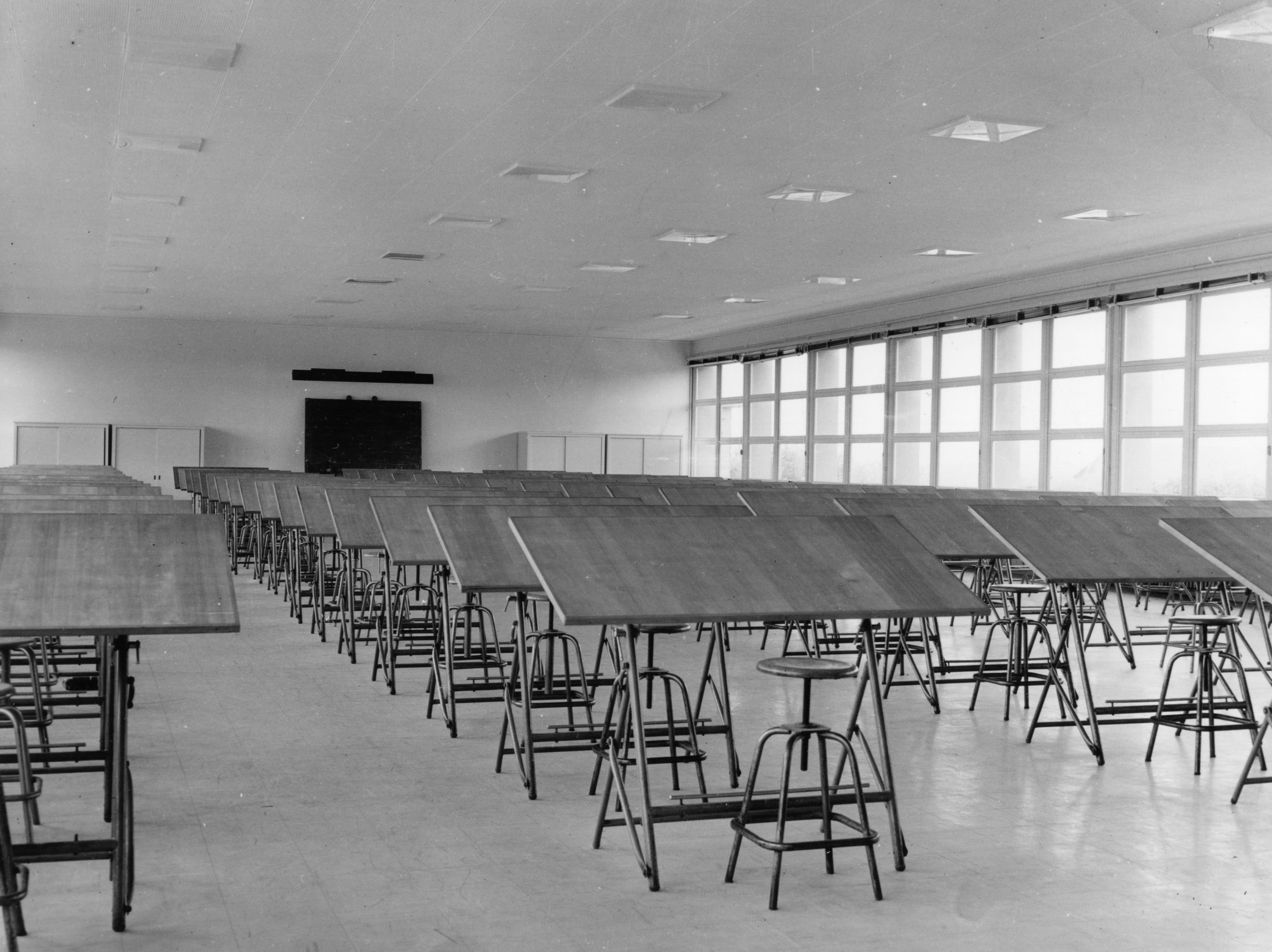
* ENSIETA : École Nationale Supérieure des Ingénieurs des Etudes et Techniques d’Armement
1819-1940 : From the Écoles de maistrance to the Écoles techniques
On 17 April 1819, the Écoles de maistrance* saw the light of day following a decision by Baron Portal, Minister of the Marine under Louis XVIII. He recommended creating a special school in each of the ports of Brest, Rochefort and Toulon, dedicated to training workers selected for their intelligence, in the practical methods of the Arts relating to Naval Architecture.
* The Maistrance were composed of « masters, overseers and assistants tasked with leading workers of the diverse trades relative to Naval Construction”
In 1868, Admiral Rigault de Genouilly, Minister of the Marine, decided to reorganize the schools into two levels of instruction : the Ecoles Préparatoires de Maistrance (preparatory schools for Maistrance) situated in Cherbourg, Brest, Lorient, Rochefort and Toulon, and the Ecoles Normales de Maistrance in Brest and Toulon. The Ecole de Maistrance in Toulon was closed in 1877. That same year, the Brest school became the Ecole Supérieure de Maistrance, then in 1972, Ecole Technique Supérieure (ETS). In 1928, the Ecole Technique Supérieure d’Artillerie Navale was created in Toulon. From 1936 onwards, the two schools were accredited to deliver the title of Engineer (the Commission des Titres d’Ingénieur was created in July 1934).
1940 – 1949 : The turbulence of the 2nd World War
The events of 1940 to 1944 did not spare the technical schools. To ensure it could continue, the Ecole Technique Supérieure des Constructions Navales which had until then been within the Arsenal of Brest, upped sticks and merged with the school of the Artillerie Navale in Toulon, to give rise to a single ETS. It moved back to Brest in the middle of 1949.
1961 to 1990 : The origins, birth and growth of ENSIETA
Following on from the creation of the Délégation Ministérielle pour l’Armement in 1961, which 16 years later became the DGA (Direction Générale de l’Armement) or the Defense Procurement and Technology Agency, several bodies merged to become the Ingénieurs des Etudes et Techniques d’Armement (IETA) and the Ingénieurs de l’Armement (IA).
ENSIETA (École Nationale Supérieure des Ingénieurs des Études et Techniques d’Armement) was founded in 1971, four years after the Weapon System Design Engineer (IETA) program was launched. Its first graduating class was made up of 36 IETA students. Training took place on two sites, with hydrography and naval construction programs based in Brest and land weapon system classes in Arcueil. Students studying aeronautic construction and space attended ENICA in Toulouse. The Arcueil site closed in 1987 and all programs, including pyrotechnic chemistry, moved to Brest.
1990 to today, ENSIETA to ENSTA Bretagne: 30 years of expansion, diversification and increasing renown
Today, ENSTA Bretagne is one of the most prestigious French engineering schools. While the school is predominantly civilian in nature, our excellence and renown are enhanced by the strong ties we have maintained with the defense sector and the French Government defense procurement and technology agency, which represent one of the most innovative fields of technological development. Our graduates contribute to groundbreaking businesses worldwide, our research center is booming, and our admissions process is increasingly selective.
In response to growing demand from businesses with an interest in the school's areas of expertise, an entrance exam was established in 1990 for civilian applicants. Student numbers grew rapidly and as of 1996, civilian students outnumbered their military counterparts and after graduating were rapidly recruited in numerous sectors.
In 1992, the school welcomed its first research professor and entered the world of engineering research. The school's research center and its groundbreaking experimental facilities were inaugurated in 2005 in the presence of France’s Deputy Minister for Higher Education and Research and numerous VIPs. Extensions built in 2010 and 2019 illustrate the vitality of our research activities, which are closely associated with various companies' R&D programs.
In December 2010, ENSIETA changed its name to ENSTA Bretagne, becoming a member of the ENSTA group along with ENSTA ParisTech. In 2012, the school adopted the Mines-Ponts entrance exam (the common entrance exam for Ecoles de Mines engineering schools), which as of 2015 became the Mines Télécom entrance exam.
Jean-Yves Le Drian, the French Minister of Defense, visited the school in 2017 to witness the signing of a strategic partnership between ENSTA Bretagne and IMT Atlantique to create an engineering center of excellence.
Over the past few years, the school has focused on diversifying its programs in order to train more general engineers and graduates in its fields of expertise in response to the demands of firms in France and abroad.
Today, ENSTA Bretagne offers 20 training cycles (5- and 6-year syllabuses) including numerous MSc programs. We are also accredited to grant PhD degrees (8-year syllabus) and we welcome a growing number of international students.
ENSTA Bretagne: Our purpose
We are committed to equipping future engineers, researchers, and industry - particularly regarding the defence, maritime, transport, and digital sectors - with the skills to understand and conceptualize the ocean and the world, as well as the capacity to design innovative and responsible solutions, thus contributing to society, and to the maintenance of the strategic autonomy of France and Europe, for a brighter future for all.
Faced with the climate emergency, but also in a context of social difficulties and inequalities, as well as the emergence of the systematic questioning of scientific facts, ENSTA Bretagne, as an engineering school and research actor, addresses issues related to sustainable development and corporate social responsibilities in order to contribute to building a society which reconciles economic, community and environmental issues in the long term.
The city of Brest has had more than its fair share of great explorers and their spirit lingers on. Student life is punctuated with international exchanges. ENSTA Bretagne is renowned on all continents. Interculturality characterizes the ENSTA Bretagne campus and the paths of its graduates.
ENSTA Bretagne trains for innovation and prepares its students to combine scientific excellence, managerial skills, and social and ethical responsibility. In their capacity as general or specialized engineers, the graduates are major players in the technological developments that society requires: in robotics, digital technologies, artificial intelligence, marine and space exploration, future transport, defense and security systems, renewable energies, new materials etc…
Cultural diversity within the student groups, the variety in the study paths, the social mix of civilian and military students, men and women, the multi-disciplinarity of the training, all go towards developing an extensive array of professional profiles which interest hi-tech industries.
Having arrived at the school through their love of science and with many talents, the students who integrate ENSTA Bretagne have numerous possibilities to develop their self-awareness within the framework of curricular and extra-curricular activities so as to build their professional career path. The specialization in one of the numerous fields of expertise available is gradual, and the exploration of the different aspects of an engineering career continues throughout their studies.
It is in Brest, the land of innovation in numerous strategic fields (defense, mobility, robotics, marine energies…) and the European Capital of Marine Science and Technologies, where the school has drawn upon almost two centuries of its technological and maritime expertise of international renown.
Training top-level engineers and conducting multidisciplinary research
Graduates of our general engineering and major programs are equipped with the skills they need to successfully design and build complex industrial systems against an international backdrop, as well as to carry out research, manage technological programs, or start their own business.
ENSTA Bretagne is a public organization. Along with the other establishments under the auspices of the French Government defense procurement and technology agency (Ecole Polytechnique, ISAE-SUPAERO and ENSTA Paris), we nurture a culture of scientific rigor and excellence which ensures our strong reputation both in France and abroad.
We focus our expertise in a wide variety of fields to meet the technological challenges set by innovative firms. ENSTA Bretagne also trains weapon system design engineers, who make up about 15% of the student body.
The school has set out its main strategic aims in the « Contrat d’Objectifs de Performance » in terms of training, research, and international awareness; a contract which binds it to its governing body, the Ministry of Armed Forces.
Delivering world-class, original teaching and research
Contributing to France’s and Europe’s strategic autonomy
Enhancing the quality of the student experience
Relying on new and strengthened alliances
Committing to sustainable practices and assuming our social responsibility
A world-class engineering school and research center
Situated in Brest, this state establishment works in close relationship with numerous industrial and academic partners in France and abroad. Its activities contribute to innovation in numerous fields of application: the maritime, defense and more generally hi-tech sectors (transport, aerospace, energy, digital technologies, research…).
Together with the Ecole Polytechnique, ENSTA Paris and ISAE-SUPAERO, ENSTA Bretagne is part of the group of engineering schools governed by the Direction Générale de l'Armement (DGA) (Defense Procurement and Technology Agency) of the Ministry of Armed Forces. They share the high requirements and excellence on which their solid international reputation has been built.
Moreover, ENSTA Bretagne sets the standard in training armament research and technology engineers (IETA). They represent 18% of the students (engineering program) on campus and prepare to design and manage major defense programs at the DGA and in companies in this field.
Multidisciplinarity, Excellence, Innovation
- Enrolment at ENSTA Bretagne opens the door to a wide range of world-renowned programs, degrees, jobs and career paths. Engineers progressively define their career objectives throughout their training, and students from diverse scientific educational backgrounds can enroll at ENSTA Bretagne to pursue numerous programs recognized for their excellence. ENSTA Bretagne's engineering degrees are accredited by the French engineering degree commission (Commission des Titres d'Ingénieur), and its Master's and PhD degrees by the French Ministry of Higher Education, Research and Innovation (MESRI). Advanced Master's degrees are accredited by the Conférence des Grandes Ecoles.
- Our graduates rapidly find jobs in French and international firms, proof that our programs meet the expectations of large businesses and innovative SMEs alike. General engineering and major graduates leave ENSTA Bretagne ready to enter the workforce and participate in the technological advances taking place in our rapidly-changing world.
- Education, research and business are our three building blocks. ENSTA Bretagne puts its scientific expertise at the service of business, and its training is enriched in turn by the real-world case studies contributed by companies. Our research programs place a strong focus on solutions for both civil and military industrial sectors. The cutting-edge research we carry out in partnership with businesses allows our research professors to train the engineers of the future to work in ever-evolving technological environments.
- An international outlook. The school has numerous bilateral academic agreements. A stay abroad is compulsory for student engineers. Almost 200 international students follow courses at ENSTA Bretagne on the numerous themes for which the school is renowned. The research professors are also internationally mobile, leading partnerships with universities and companies based in over thirty countries worldwide.
- The ENSTARTUPS incubator hosts the founders of companies, technological projects and encourages entrepreneurship in the students and research professors. Apart from entrepreneurial awareness and training, ENSTA Bretagne contributes to numerous events which encourage innovation and company creation.
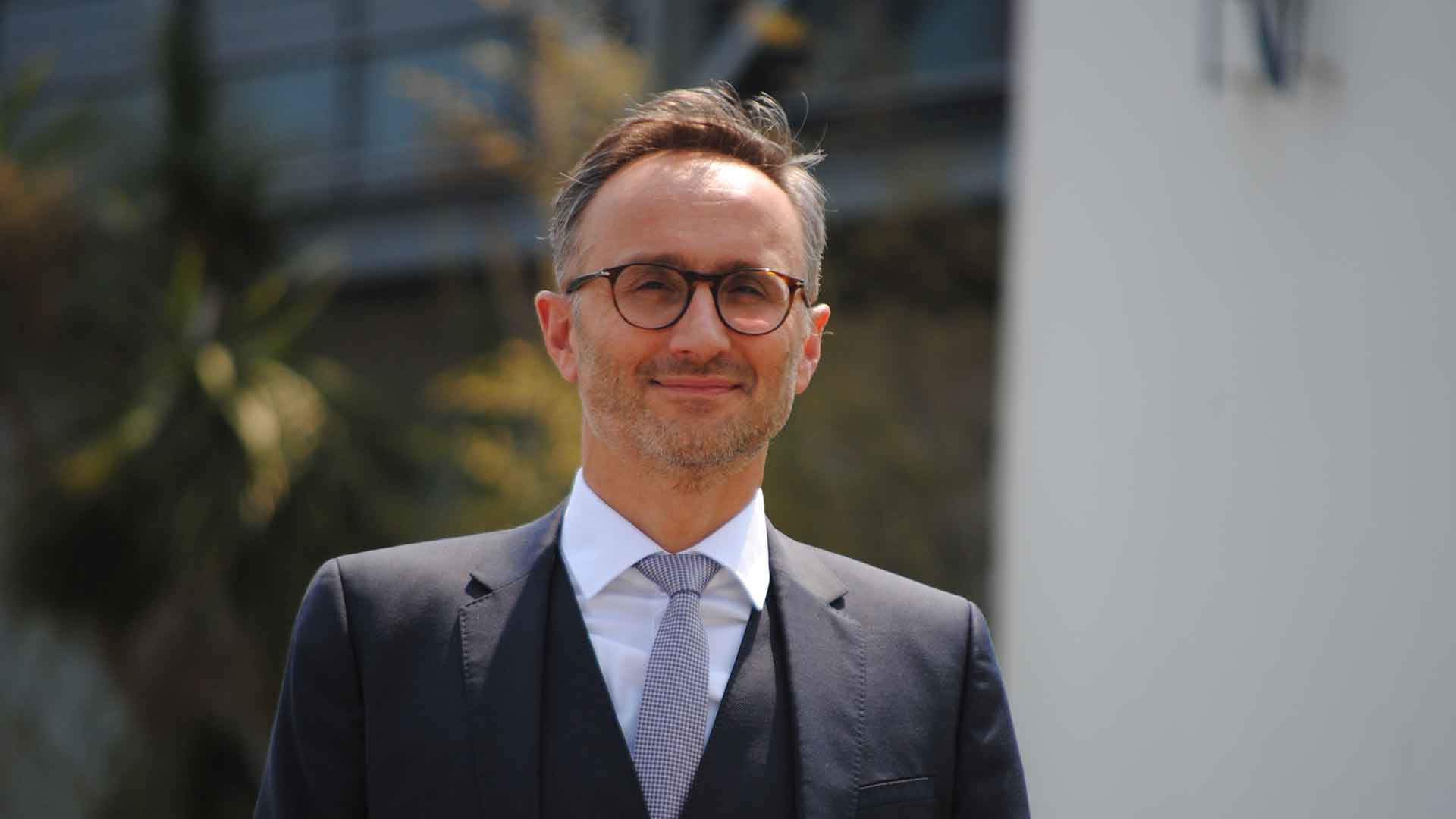
A word from the Director of ENSTA Bretagne, Bruno Gruselle
ENSTA Bretagne is constantly growing, and our numerous scientific disciplines have earned a strong reputation in France and abroad. Students and staff benefit from our unique multidisciplinary approach, strong ties with numerous high-tech firms, countless student study and design projects, and research focusing on real-world solutions, as well as our ability to meet the need for specialized skill sets and to build lasting partnerships, and our social, cultural and sport activities. I invite you to take a moment to explore our website and learn more about our world-class engineering school, its facilities and the many activities it offers, and I hope to see you soon on the ENSTA Bretagne campus.
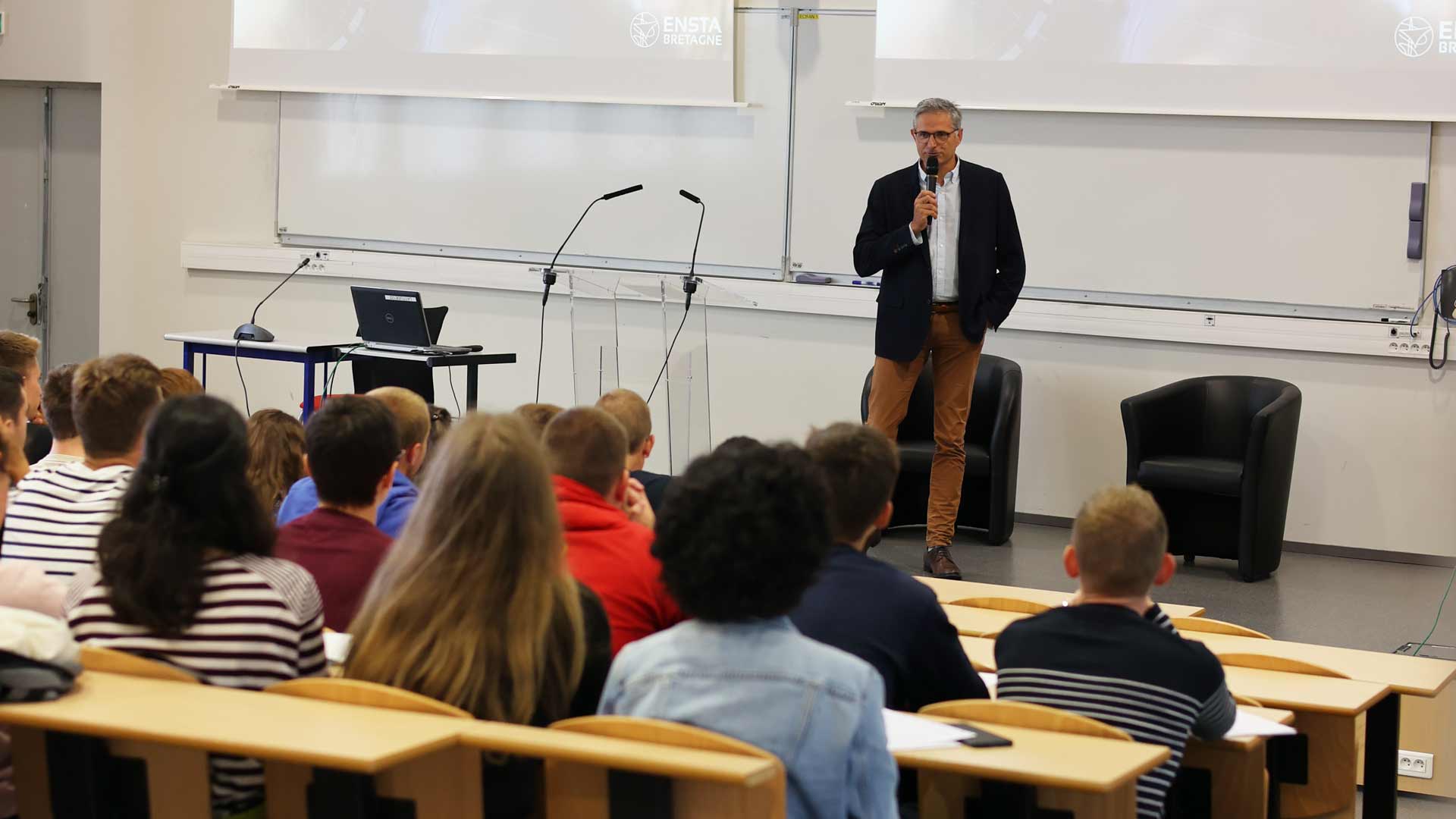
Chosing ENSTA Bretagne is to:
- ensure you have scientific and technological training which is recognized by companies worldwide,
- benefit from optimal living and study conditions,
- participate in numerous and exciting curricular and extra-curricular projects and activities,
- discover a region which expertly combines authenticity and a pioneering spirit, cultural discoveries and scientific research, an exceptional coastline and a dynamic city,
- participate in the societal and technological challenges of the future,
- ensure you have an fulfilling career!
The Student Union, a key student organization
The Student Union coordinates all extracurricular activities on offer to students: social and sporting events, galas, welcome weekend for new students, cohesion day (for students, faculty and staff members), etc.

Gala – an evening of glitz and glamor
Organized from A to Z by the students, the gala is THE event of the year
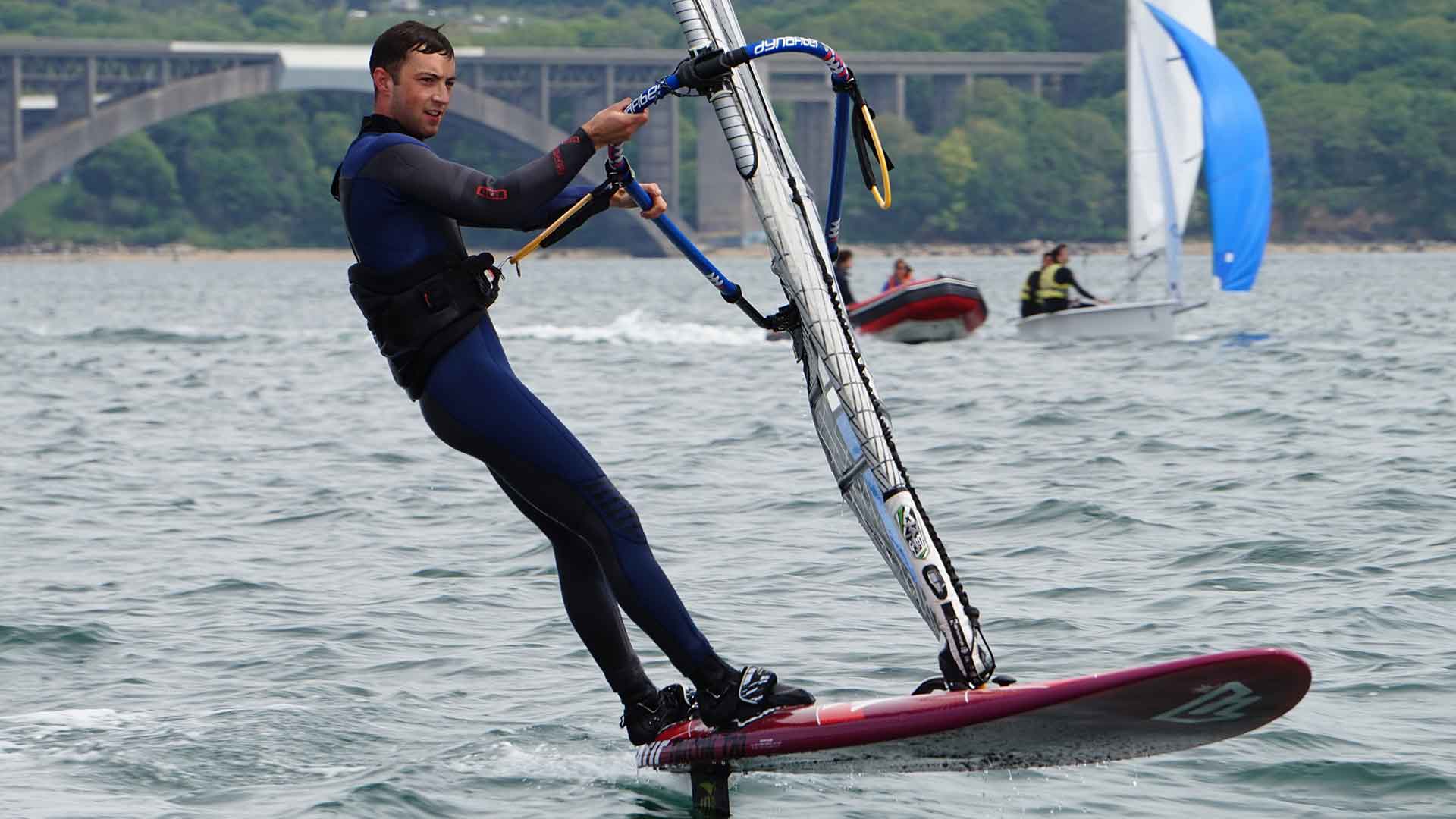
Water sports
In close proximity, the Brest Roadstead is an immense water sports playground. Whether you are a beginner or an expert, many activities are possible with the Bureau de la Glisse and ENSTA Bretagne Sailing Team.

Ski Week
Each year, the BDE organizes a minimum cost, maximum fun winter sports week!
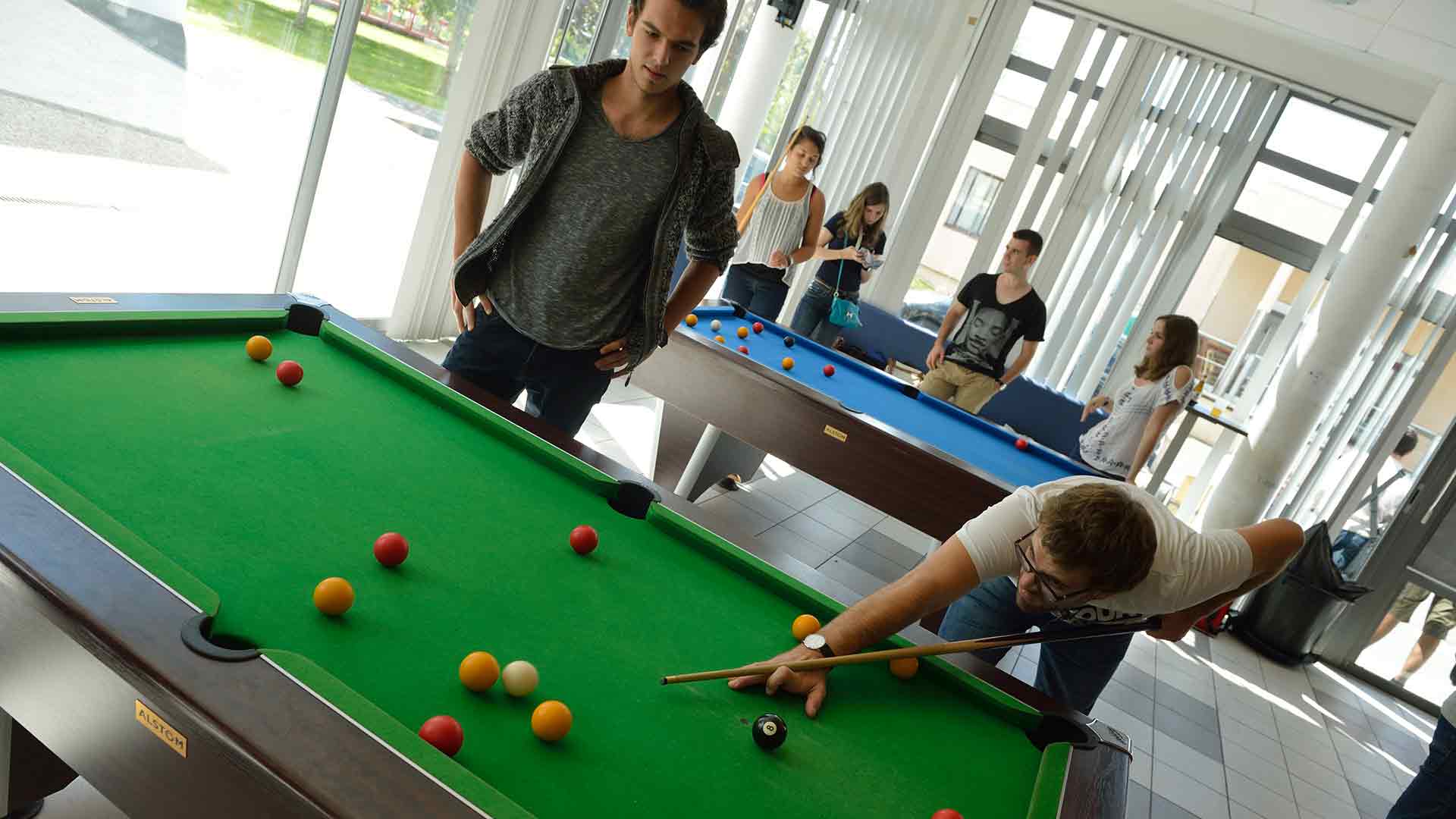
The Foy'z
Managed by the Foy’s men & women (students from the school), the Foy’z is THE place to get together outside lessons: have a coffee in the lunch break, have a snack after evening lessons and spend some quality time with friends.
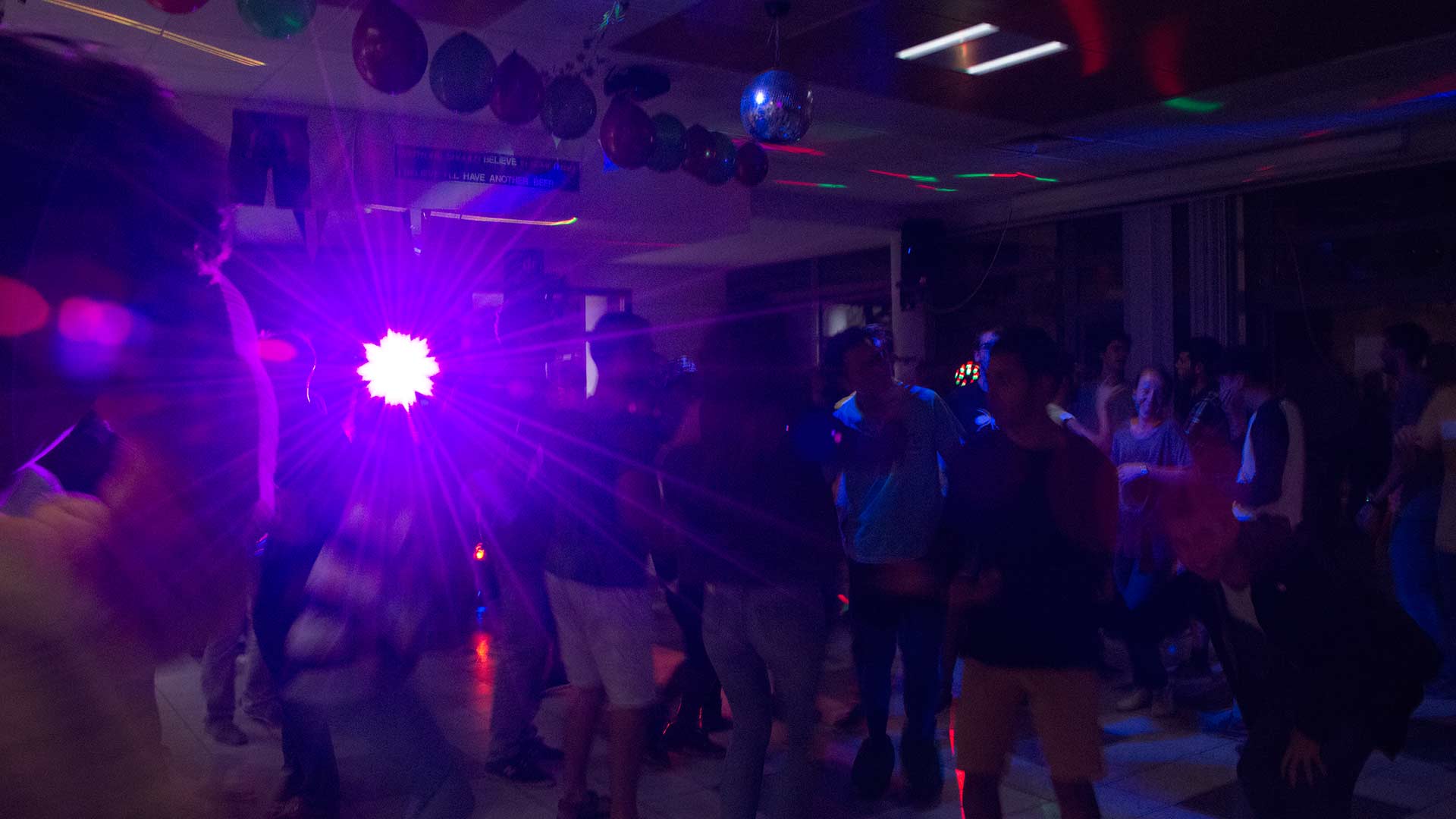
The Foy’z by night
Regularly throughout the year, there are theme evenings organized in the students’ building (Foy’z): Mix nights (hosted by the YESS: Yéti Sound System), poker or match evenings…there is something for everyone.

Integration Weekend
The culmination of the freshers period, the integration weekend is two days of festive fun organized by the student union each year in September.
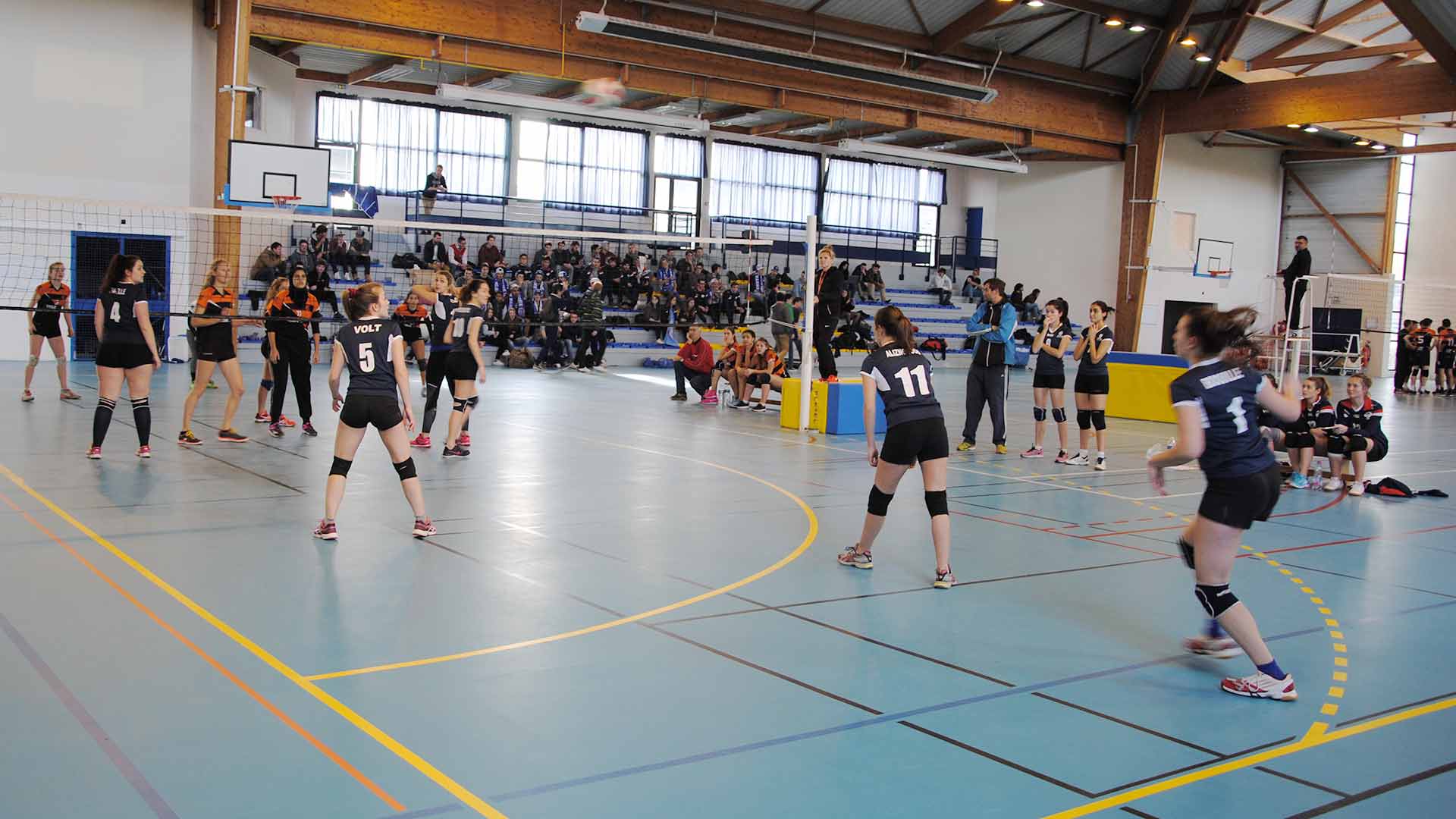
Sports
Sport is an integral part of ENSTA Bretagne student life. Every Thursday afternoon and evening there are training sessions on offer, via the sports association. There are numerous events and tournaments throughout the year: FFSU, TSGED, TOSS etc
The student life center
The Student Union is in charge of the student life center and the student lounge and coordinates the network of student clubs.
The Sports Union
The Sports Union is part of the Student Union and offers a wide range of sports activities (rugby, handball, volleyball, soccer, basketball, swimming, fencing, table tennis, tennis, badminton, judo, diving, climbing, sailing, etc.), most of which can be enjoyed on campus.
The clubs
Numerous clubs offer a wide range of cultural and leisure activities: video, IT, astronomy, model building, photography, cue sports, comic book reading, role-playing, drama, music...
And if your dream sport isn’t available yet, the Student Union and the school will help you get it on the list!
Boutique
Where can you order your year’s sweatshirt…at the Boutique ! Other items are also available on sale from the Maison des Eleves.
It’s the start of the school year. This month is all about welcoming new students, culminating with the welcome weekend (WEI)
Class sponsorship: a company director sponsors a class of ENSTA Bretagne engineers
International student event and Student Alumni Forum
Open House event
SKI week
Student Union election campaign
Start of the sailing competitions
WER: Alumni reunion weekend
End-of-year party
Autonomous Robotics
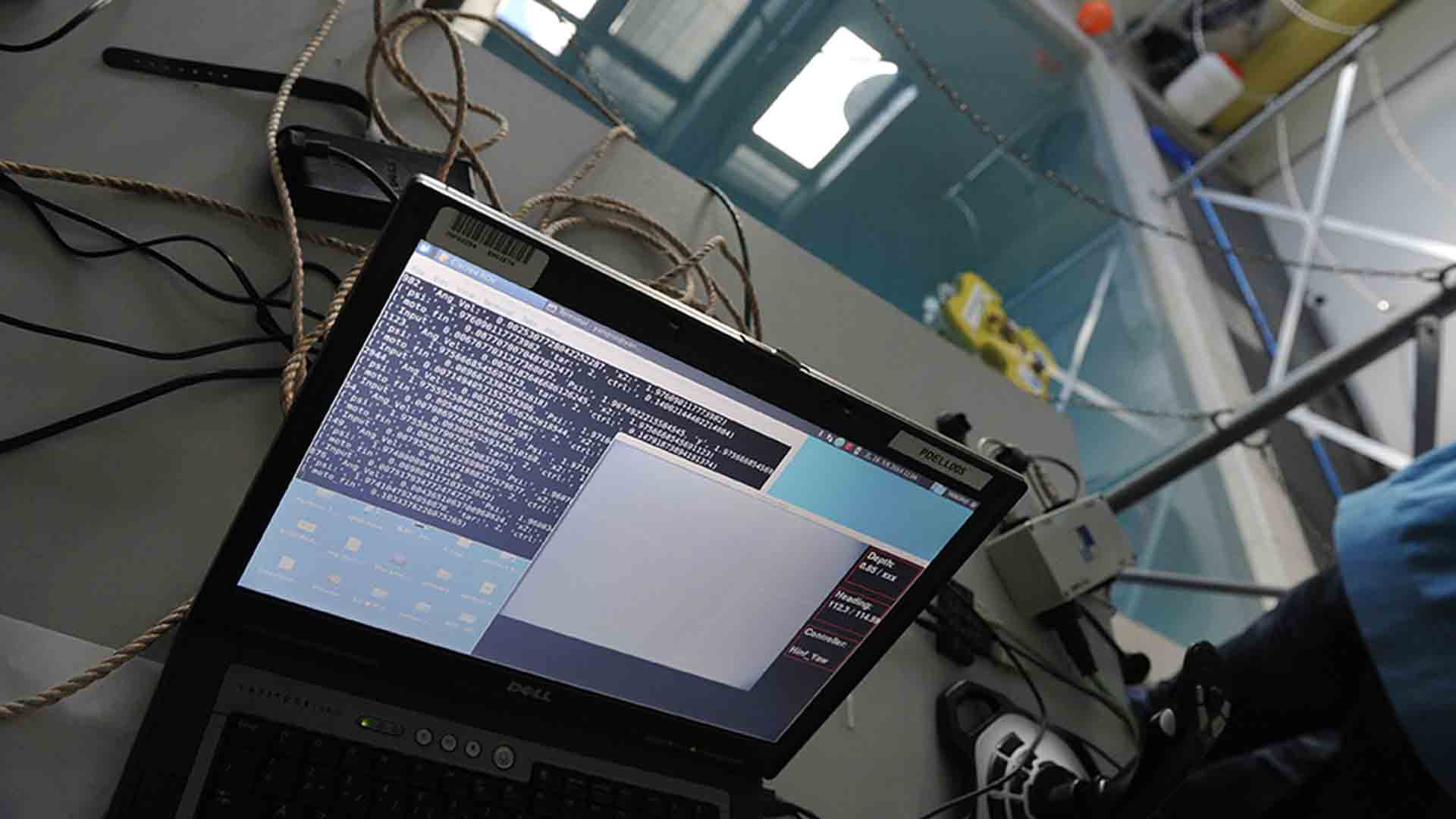
Robotics is a field of the future that reflects the multidisciplinary nature of ENSTA Bretagne.
Research at ENSTA Bretagne delves more particularly into the challenges of autonomous, mobile and underwater robotics: how can the robot be located? Monitored? How can a fleet of robots be coordinated? … in complex environments like the marine setting.
Multidisciplinary skills need to be brought together to tackle the issues encountered. On the one hand, physics of the marine environment, sensors, design of mobile platforms and programming are required to design robots. On the other, localization and control algorithms enable creation of their embedded intelligence.
The multiple scientific challenges involved in this work (robot autonomy, coordination, stealth, etc.) form the basis of numerous research projects at ENSTA Bretagne, for which it partners with innovative small businesses and corporations in France and abroad.
Program strengths
Prizes and international recognition
- 1st prize in the 2016 European Student Autonomous Underwater Vehicles Challenge (SAUC-E)
- 1st and 2nd prize in the World Robotic Sailing Championship (2018, 2015, 2014 and 2013)
- 7th prize in the 2015 European euRathlon competition for a project that involved several robots to carry out missions in hostile environments
Prix Moore
- In 2012, Luc Jaulin, an ENSTA Bretagne research professor, received the R.E. Moore Prize for Applications of Interval Analysis for his work on autonomous robotics.
The Guerlédan project: field experimentation for robotics students and hydrographers
Every year, hydrography and robotics majors visit the artificial lake at Guerlédan dam to carry out joint experiments in the field.
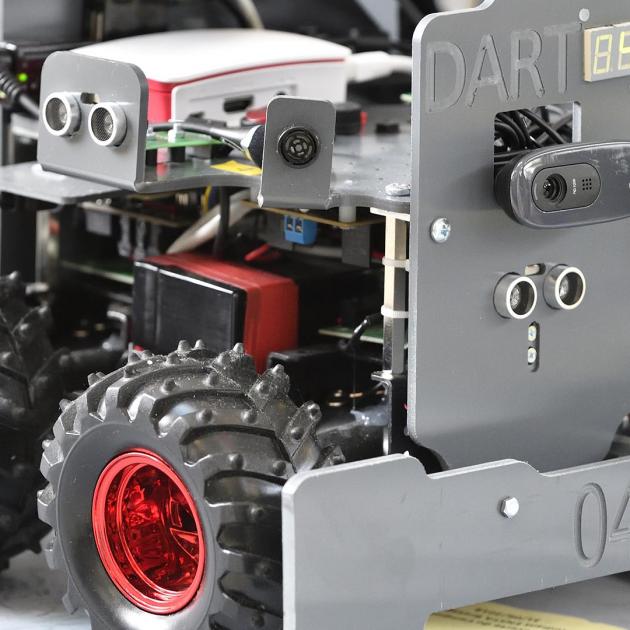
- Learn more about the Autonomous Robotics major offered in our "diplôme d'ingénieur" program (equivalent to an MSc in Engineering): a 3-year syllabus for BSc or equivalent graduates, or a 2-year program for 1st-year Master's graduates
- Admission
Cette spécialité est offerte aux élèves Polytechniciens dans le cadre de leur 4e année.
- Découvrir ce parcours en robotique mobile
- a 3-year program for MSc degree holders
- Enrollment in ENSTA Bretagne and affiliation with the SPIN doctoral school and Lab-STICC (Joint Research Center 6285 of the CNRS)
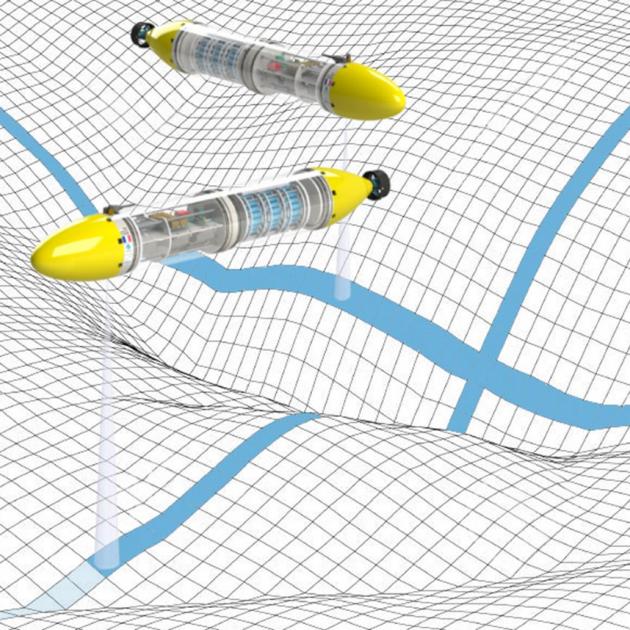
Algorithm development for autonomous mobile robots used in physical environment perception (especially in marine environments) on both axes of the perception-action loop:
- Action in an uncertain and unstructured environment: Robust control, localization and planning (sensors, robots) through interval analysis, organization of drone swarms.
- Dynamic perception: Processing spatially and temporally distributed data, characterizing the environment and its uncertainty, capitalization.
- Lab-STICC is a CNRS joint research center (UMR 6285) with 600 members from ENSTA Bretagne, IMT Atlantique, ENIB, UBO, UBS and CNRS.
- ENSTA Bretagne is the third most important contributor to this shared lab
- Robust, accurate and reliable localization of underwater robots
- Securing an area with robots
- Controlling underwater drone swarm







